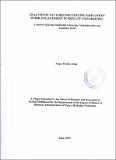| dc.description.abstract | ABSTRACT
Employee engagement is the binding of an individual to his or her roles at work whereby employees express themselves cognitively, materially, and expressively while performing their work roles in work engagement. It is a very essential driver for an organization to attain a competitive advantage. Employees who are engaged in their work and committed to their organizations give companies crucial competitive advantages including higher productivity and •1ower employee turnover. This study examined factors influencing employees' work engagement in private .universities; case study of Kenya Methodist University (KeMU). Work engagement entails the active use of emotions in addition to the simple use of cognition while completing work tasks. The study was guided by five specific objectives including testing the level of work vigour, work absorption, work dedication, social demographic factors and organizational support. Five null hypotheses were tested on the acceptability or rejection of five independent variables on the dependent variable. The research methodology used descriptive approach to achieve the research objectives. The research utilized primary data collected through administration of questionnaires. The target population was 561 which were made up of 332 academic staff and 229 administrative staff with a 30% sample size determined. Each stratum was established to select the sample size of 100 academic staff and 69 administrative staff totaling to 169 questionnaires. A total of 112 questionnaires were returned but 92 questionnaires were duly filled and used for data analysis. Multiple liner regression analysis was used to link the relationship between independent variables and dependent variables and to test hypothesis. Descriptive statistics and Chi-square with aid of SPSS was used to analyze the data. From the hypothesis tests, it can be observed that three independent variables had significant association with Employees' Work Engagement: that is, Work Dedication, Work absorption and Organisation Support. Work dedication has a significant influence on employees' work engagement because majority of respondent (89.2%) were inspired by their job. The results also indicated that there was a significant relationship between work absorption and employees work engagement by 89.2% of respondents claiming that they rarely detach themselves from their work. 100% of employees were comfortable with the working environment but majority ( 41 % ) of the employees felt that management sometimes empowers them to do the work. These results revealed that there was no strong evidence to show that social demographic attributes of the employees in KEMU had significant association with Employees' Work Engagement. The research makes various recommendations including organization creating structures to facilitate access to resources, have a working environment with higher levels of job autonomy, low task complexity, supervisory support, and the internal locus of control, and ensure employees maintain high energy levels and mental resilience are willing to exert effort and to persist in difficult times. | en_US |

